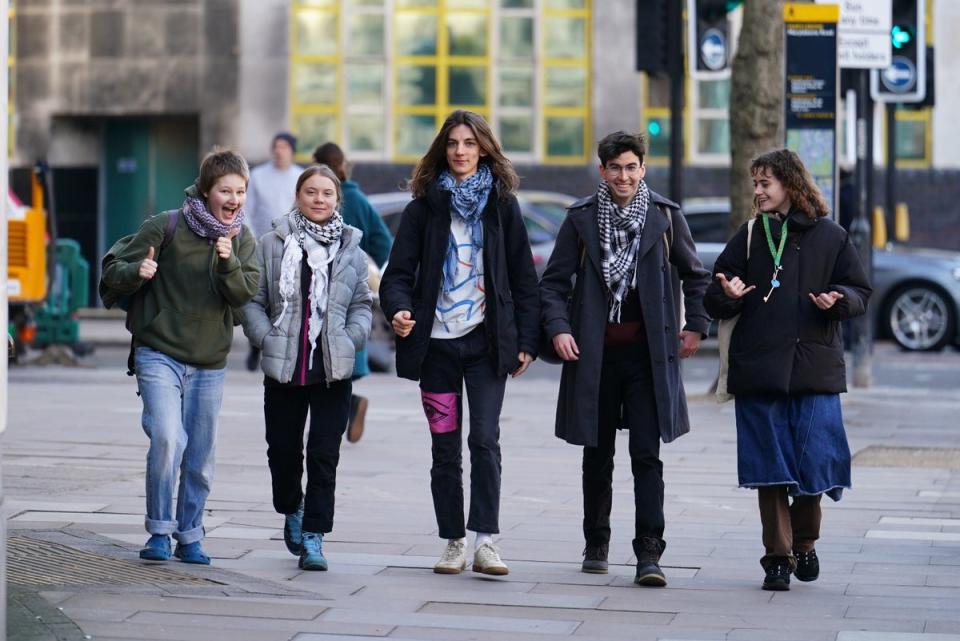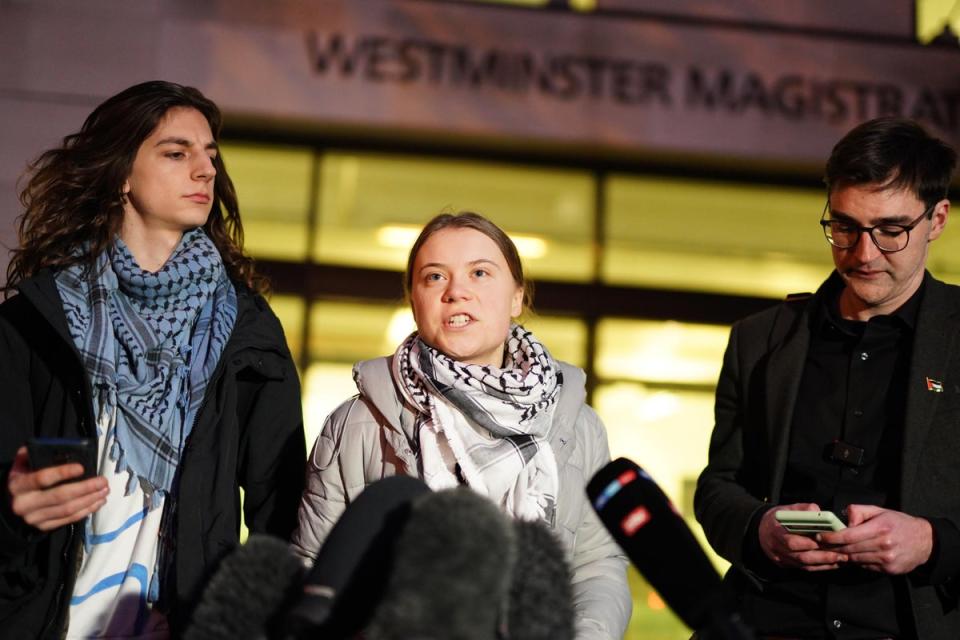Greta Thunberg arrested after refusing to move from hotel during climate protest, court hears
Climate campaigner Greta Thunberg refused to move from a hotel entrance despite requests from police officers, causing her arrest at a protest in central London, a court heard.
The 20-year-old had been demonstrating outside the InterContinental Hotel in Mayfair on 17 October, as leading oil executives attended an annual summit.
On Thursday, Westminster Magistrates’ Court heard she was given a final warning by two Metropolitan Police officers, but allegedly refused to move towards the designated protest area and said she was “staying where she was”.
After the day’s proceedings, standing outside the court with some of her co-defendants in the case, Thunberg defended climate activists facing prosecution, saying “we must remember who the real enemy is”.
In court, she was joined by two Fossil Free London (FFL) protesters and two Greenpeace activists who have also pleaded not guilty to breaching Section 14 of the Public Order Act 1986.
The Swedish national blocked Hamilton Place, near Park Lane, on the first day of the Energy Intelligence Forum, where bosses of Shell and Total were due to speak, the trial heard.

Formerly known as the Oil and Money conference, a number of senior CEOs, businessmen and political figures were in attendance to discuss sustainable solutions to world energy challenges.
At around 7.15am, a number of activists descended on the scene and began to block the hotel entrances and security exits. By 10.23am, protesters had gained access to the roof of the building and were slowly abseiling down, while a vehicle entrance was also blocked by midday.
Thunberg stood outside the hotel entrance and was approached by police, informed of the condition and the designated protest area, the court heard.
PC Tony Sothinathan, who arrested Ms Thunberg, told the court he explained to the activist she had to move away from outside the hotel towards Hamilton Place where she could continue to protest peacefully.
He then said she refused to move and didn’t respond when told she would be liable to arrest.
After reviewing PC Sothinathan’s body cam footage, Ms Thunberg’s lawyer claimed she might not have heard her conditions for arrest due to loud chanting and a large crowd.
The officer said he was confident she did hear his instructions, despite his voice not being audible on separate body cam footage for a nearby officer.
Superintendent Matt Cox, who was in charge of policing on the day, told the court: “Essentially the delegates weren’t able to get in and out of the hotel, it was relayed from security that people weren’t able to get out of the hotel. People were really restricted on how they could access the hotel.”
Those affected included a group of 30 guests who were due to catch flights. The court heard that after repeated engagement with the activists, police imposed a Section 14 order and began informing protesters that they were required to move to a designated protest area on the pavement.

The Met Police said that a number of protesters had failed to comply with requests to leave the road, and were subsequently arrested.
Pictures showed activists carrying banners and pink umbrellas, while others lit pink and yellow flares.
The Metropolitan Police had imposed conditions on the 17 October protest under Section 14 of the Public Order Act to “prevent serious disruption to the community, hotel and guests”.
A further 21 people who took part in the same demonstration, including supporters of Extinction Rebellion, are also due to appear on later court dates.
Thunberg is appearing alongside Christofer Kebbon, 19, Joshua James Unwin, 32, Jeff Rice, 57, and Peter Baker, 59, in November, with supporters also gathering outside Westminster Magistrates Court to protest. FFL held a demonstration in solidarity with the defendants outside court from 8.45am.
Outside the court, she made a statement in which she said: “Even though we are the ones standing here, climate, environmental and human rights activists all around the world are being prosecuted, sometimes convicted and being given penalties for acting in line with science.
“We must remember who the real enemy is. What are we defending? Who are our laws meant to protect?”
The trial, expected to last two days, continues.


